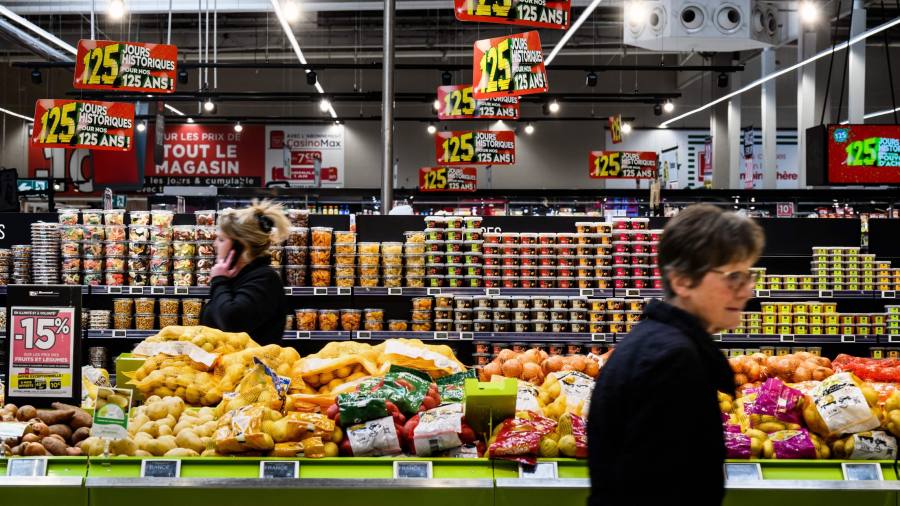Inflation in Germany and France has fallen faster than economists expected to hit the lowest levels for at least a year, boosting hopes that cooling price pressures will allow monetary policymakers to stop raising eurozone interest rates soon.
The drop in German annual inflation from 7.6 per cent in April to 6.3 per cent in May reflected a sharp slowdown in energy prices as well as lower inflation for food, other goods and services. Economists polled by Reuters had forecast a figure of 6.8 per cent.
French inflation fell to 6 per cent in May, down from 6.9 per cent. Slowing price growth in all areas except tobacco took the French rate below the 6.4 per cent level forecast by economists.
The cooling of price pressures in the eurozone’s two biggest economies — as well as a bigger than expected drop in Spanish inflation to almost a two-year low — lifted economists’ expectations that the European Central Bank may stop increasing rates by July.
“We now see clear signs of disinflation in the eurozone,” said Claus Vistesen, economist at research group Pantheon Macroeconomics. “Investors should brace for a change in tune at next month’s meeting [of the ECB], setting the stage for the hiking cycle to end in July.”
Investors responded by scaling back their bets on how much higher the ECB will raise rates. Germany’s rate-sensitive two-year bonds rallied, while the euro fell 0.5 per cent against the dollar to $1.0684, its lowest level for more than two months.
There are some signs that the ECB’s rate rises are starting to have an effect by restricting activity and cooling runaway price pressures. The German economy has contracted for the past two quarters, while eurozone bank lending has stagnated for six months.
Krishna Guha, vice-chair of US investment bank Evercore, said tighter monetary policy was “having its first dampening effects on activity”, adding that he had detected “a notable shift in tone among policymakers”.
Eurozone inflation is expected to fall from 7 per cent in April to 6.3 per cent in May when those figures are published on Thursday, according to a Reuters poll of economists.
But the ECB is focused on core inflation, which strips out energy and food prices, and policymakers have said they want to see this measure falling towards its 2 per cent target before they stop rate rises. If core inflation drops by more than the slight dip from 5.6 per cent in April that economists expect, it could allow the ECB to stop raising rates this summer.
As energy and food prices soared last summer, the ECB raised its deposit rate by an unprecedented amount from a record low of minus 0.5 per cent. It is expected to increase the rate by another quarter percentage point to 3.5 per cent when it meets in two weeks.
Luis de Guindos, vice-president of the ECB, said on Wednesday that the latest data was “positive news”. But with core inflation still a concern, he added: “Has the battle been won? I would not say that.”
There were still signs of persistent price pressures in other parts of Europe’s 20-country single currency bloc. Italian inflation fell, but by less than expected, from 8.7 per cent in April to 8.1 per cent in May. Economists had expected it to fall to 7.2 per cent.
Ignazio Visco, the governor of Italy’s central bank who sits on the ECB’s governing council, noted that core inflation was “still high”, after falling from 6.7 per cent in April to 6.5 per cent. The ECB had a “tough challenge” to bring inflation down to its 2 per cent target without causing an “excessive brake on consumption and investment”, he added.
In Belgium, headline inflation fell to an 18-month low, but core price growth still accelerated from 8.3 per cent in April to 8.7 per cent in May.
Germany’s federal statistical office said government subsidies helped to lower energy inflation from 6.8 per cent in April to 2.6 per cent in May, while the dip in services inflation from 4.7 per cent to 4.5 per cent was “probably due in part” to the launch of a subsidised €49 monthly public transport ticket.
Read the full article here




